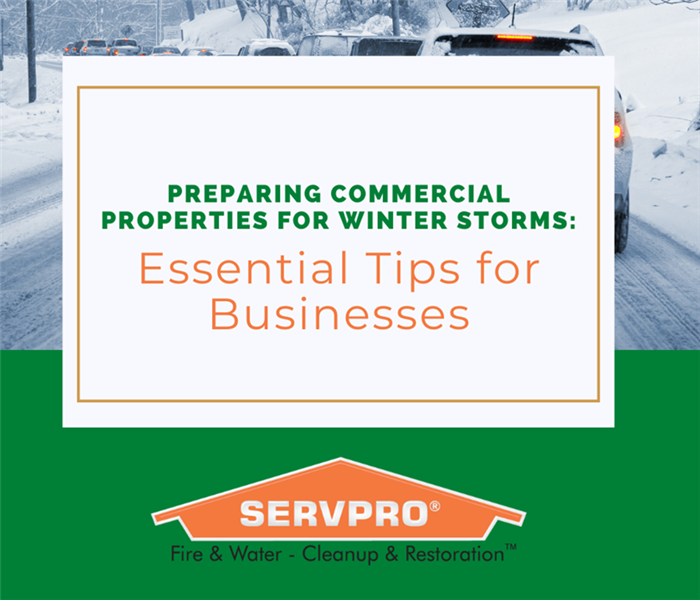Preparing Commercial Properties for Winter Storms: Essential Tips for Businesses
11/2/2024 (Permalink)
Winter storms can be harsh, especially for business owners with commercial properties at risk. Snow, ice, high winds, and freezing temperatures can lead to costly repairs, operational interruptions, and safety concerns for employees and customers. Preparing in advance is essential to prevent extensive storm damage. Here are key steps for winterizing your commercial property, focusing on roof security, water damage prevention, and backup power systems.
**1. Secure Your Roof to Shield Against Snow and Ice**
Your roof is the first line of defense against winter weather. Heavy snow, ice dams, and freezing rain can cause serious damage if your roof isn’t properly prepared. Follow these tips:
- **Inspect and Repair**: Have a professional inspect your roof for loose shingles, damaged flashing, or wear and tear. Addressing these issues early can prevent leaks and structural damage from snow or ice buildup.
- **Clear Gutters and Downspouts**: Clogged gutters can lead to ice dams, which prevent water from draining off the roof and back up into your building. Clean gutters thoroughly and ensure downspouts direct water away from the building’s foundation.
- **Invest in Roof De-Icing Solutions**: De-icing cables can prevent ice dams from forming, allowing snow and ice to melt and drain properly.
- **Snow Removal Plans**: If heavy snowfall is common in your area, create a plan to remove snow from the roof to prevent structural strain.
**2. Prevent Water Damage from Snow, Ice, and Flooding**
Winter storms bring a high risk of water damage from rapid snowmelt and freezing rain. Here’s how to prevent costly water intrusion:
- **Seal Windows and Doors**: Gaps or cracks around windows and doors can let in cold air and moisture. Caulk or weatherstrip these areas to keep your building dry and energy-efficient.
- **Insulate Pipes**: Frozen pipes are a common winter hazard. Insulate exposed pipes, especially in unheated areas, to prevent them from bursting.
- **Maintain Proper Drainage**: Ensure that water drains away from your building to avoid flooding in basements or lower levels. Install a sump pump if your property is flood-prone.
- **Check for Roof Leaks**: After heavy snowfall, inspect your roof for leaks or damage to catch small issues before they escalate.
**3. Backup Power Systems: Keep Your Business Running**
Power outages are common during winter storms and can halt business operations. A reliable backup power system is crucial:
- **Install Backup Generators**: A commercial generator can power essential systems like heating, lighting, and IT infrastructure. Choose one suited for your business’s needs, and service it regularly.
- **Use Uninterruptible Power Supplies (UPS)**: UPS devices provide short-term power for sensitive equipment, protecting it from outages or surges.
- **Test Backup Systems Regularly**: Schedule routine maintenance to ensure your systems will work when needed.
- **Create a Contingency Plan**: Prepare a plan outlining steps to take during a power outage, including contacting your backup power provider and notifying employees.
**4. Winterize Your HVAC System**
Your HVAC system is essential for maintaining a safe and warm environment. Prepare it for the colder months by:
- **Scheduling a Tune-Up**: Have a professional inspect the HVAC system, replace filters, and check for leaks or heating element issues.
- **Check for Carbon Monoxide Leaks**: Heating systems can produce carbon monoxide if not properly vented. Install detectors and ensure your system is safe.
- **Maintain Proper Ventilation**: Good ventilation prevents moisture buildup, which can lead to mold growth.
**5. Develop an Emergency Storm Plan**
A clear emergency plan protects both your property and employees:
- **Communication Plan**: Ensure employees know how to get updates on closures, outages, or safety procedures. Assign key personnel to manage storm responses.
- **Emergency Supplies**: Stock flashlights, batteries, first-aid kits, blankets, and non-perishable food in case of a power outage.
- **Maintenance Schedule**: Keep a year-round maintenance schedule for your roof, HVAC, and backup power systems to ensure they’re ready for winter.
Winter storms don’t have to disrupt your business. By preparing your roof, preventing water damage, maintaining backup power, and winterizing your HVAC system, you can minimize downtime and avoid costly repairs. If you’re unsure where to begin, a professional restoration team can assess your building’s vulnerabilities and implement necessary precautions. Don’t wait for the first storm—start preparing your commercial property today.
As a trusted leader in the restoration industry, SERVPRO of Newton / Wellesley offers the advanced training and equipment to protect your property. Call us at (617) 332-9000.






 24/7 Emergency Service
24/7 Emergency Service
